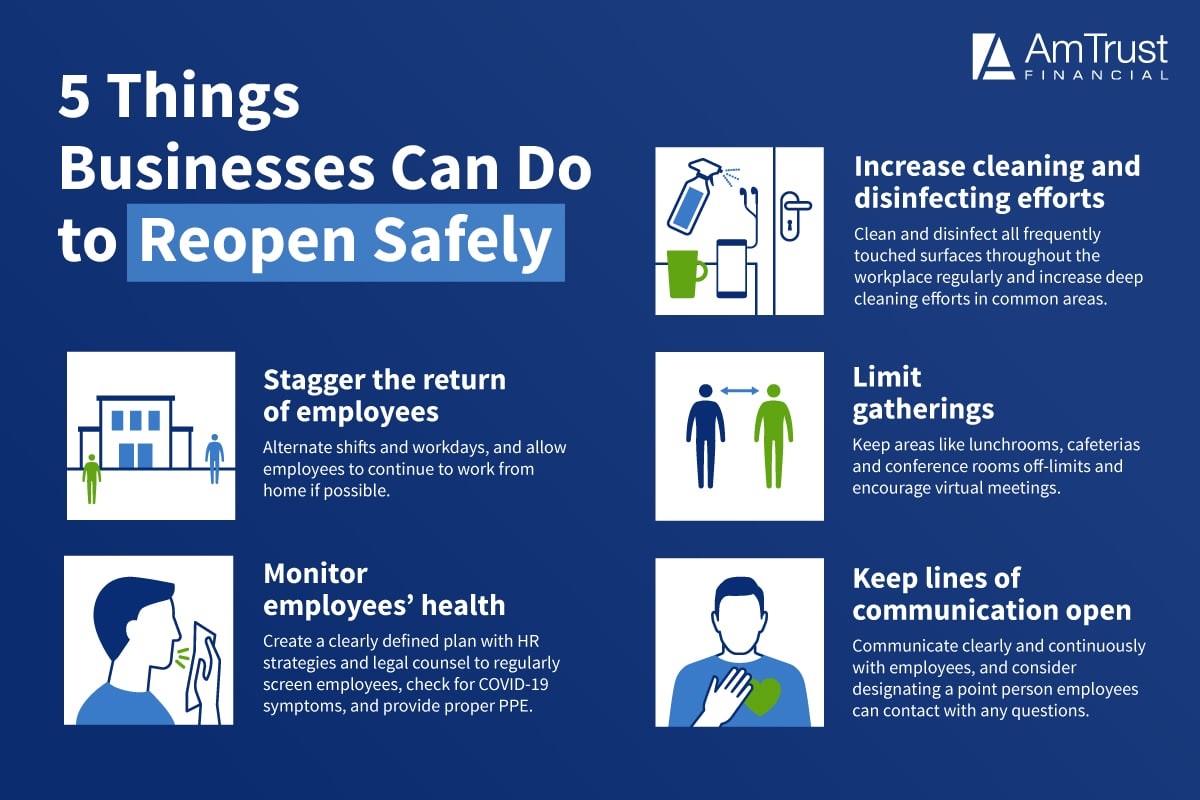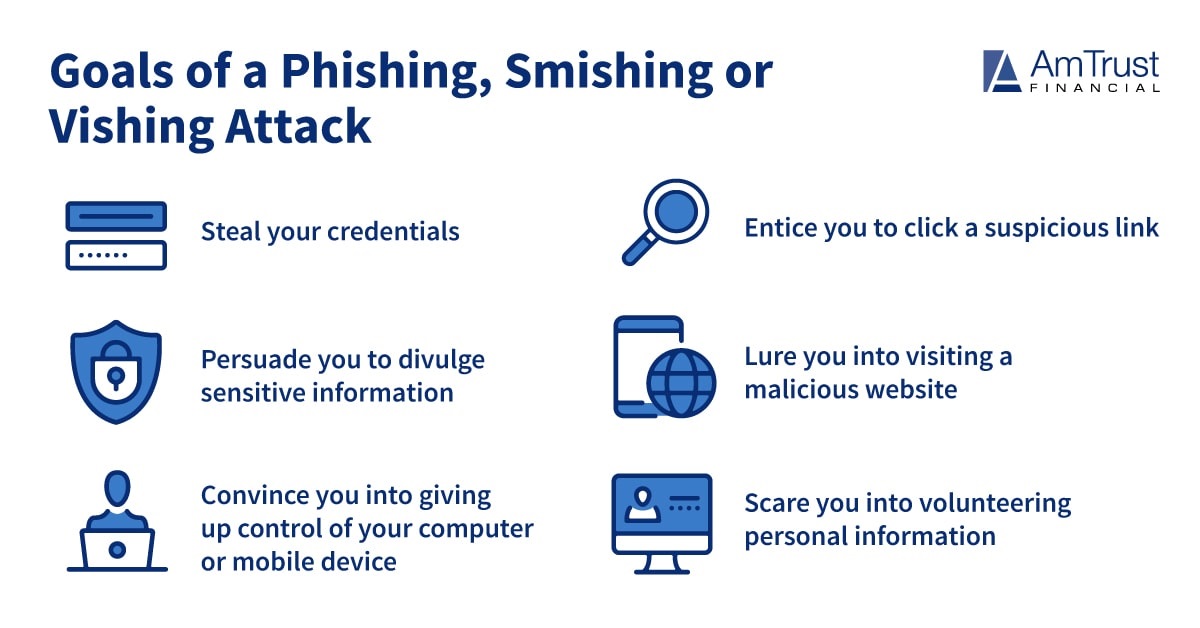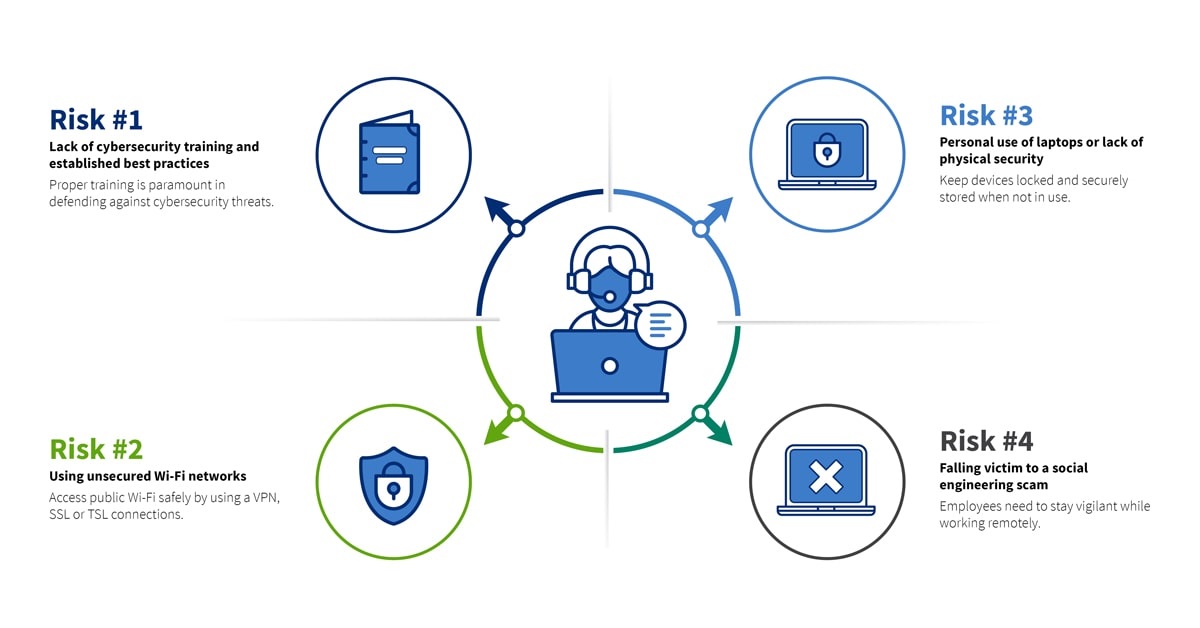Summary: In our new Guide to Getting Back to Business, we discuss best practices to ensure businesses reopening in a few key industries do so as safely as possible. We’ll also provide tips for remote workers, as some organizations may continue to allow employees to work from home for the foreseeable future. Keeping Employees and Customers Safe While Reopening
The United States has started reopening the economy one small step at a time. In early May, President Trump announced a three-phase approach called
Opening Up America Again, with guidelines to help state and local governments safely get individuals back to work, while also keeping public health top of mind.
About
95% of the country has been under some form of lockdown since mid-March, with governors issuing stay at home or shelter in place orders to help prevent the spread of the coronavirus. While essential businesses like
grocery stores and
pharmacies have remained opened, restaurants, retail stores and others undoubtedly have been anxiously awaiting the day they can start getting back to business as usual.
AmTrust is excited to offer our new Guide to Getting Back to Business, in which we offer best practices, safety tips and recommendations for businesses in a few key industries, as well as those working remotely, to get back to work as safely as possible.

Section 1: Tips for Safely Reopening Businesses
Small business owners may be anxious to welcome customers back, but there’s no denying that life as we know it has drastically changed. The
coronavirus pandemic effectively shut down most of the country, with businesses closing their doors and employees furloughed or working from home. As quickly as the shutdown occurred, reopening businesses will go at a more gradual pace. It will take some time for the nation to adjust to a new normal way of life.
Keeping Employees Safe Businesses of all sizes, in all industries, can take the following measures to keep their employees and customers safe and healthy as they prepare to reopen their doors:
 Create a Face Mask Policy
Create a Face Mask Policy As more businesses continue to reopen over the next several months,
wearing face masks will likely remain a popular preventative measure throughout the country. Cloth face coverings can potentially slow the spread of the virus, especially from asymptomatic carriers who may be unaware they have it. These coverings provide an extra layer of protection to keep respiratory droplets from coughs or sneezes from infected individuals from becoming airborne.
Enforce Proper Hand Washing Experts say the best way to avoid contracting coronavirus is through practicing safe personal hygiene practices, including constant
hand washing. The Centers for Disease Control (CDC) states in guidelines that proper hand hygiene, which includes the use of an alcohol-based hand rub or handwashing, is a simple and important way to limit the spread of COVID-19.
Be Aware of Employee Burnout Business closures, anxiety from the unknowns about the virus, and the uncertainty once the stay at home orders are lifted have increased stress levels. More than ever, it is crucial that you understand the
signs of stress, anxiety and employee burnout and can manage these issues or know where to go if you need help. If one employee is feeling burnout, it can affect an entire team, the customers and ultimately the business itself.
Employee burnout is the result of physical and emotional exhaustion and work stress. It can happen any time; however, it has become more prevalent during the coronavirus pandemic. Both individuals working from home and essential workers need to find ways to learn stress management techniques to help to relieve mental health issues related to the COVID-19 crisis.
It can happen any time, but it has become more prevalent during the coronavirus pandemic. To avoid burnout, encourage employees to:

Section 2: Potential Cyber Threats to Your Business and Employees
The outbreak of the coronavirus has forced businesses everywhere to operate with a remote workforce in an effort to keep employees safely at home and keep operations running. Work from home, telecommuting, remote office – no matter what you call it, it means one thing: personnel working in a setting other than a company office, while ensuring that productivity does not suffer.
For some businesses, the infrastructure needed for working remotely had already been in place; however, the COVID-19 situation is a trial by fire for companies and employees new to working from home. All indications are that
remote work policies or work from home benefits will continue to become more commonplace among businesses, not only as part of a business continuity plan during a pandemic like COVID-19, but in the future, too.
Working from home does come with some disadvantages. It can lead to cybersecurity threats for businesses offering this benefit to their workforce, employee burnout, and even health concerns from improper home office ergonomics.
AmTrust identifies some of the top cyber security issues – and how to reduce them.
Social Engineering Scams Cybercriminals are using “
social engineering” to commit their crimes – the act of deceiving or manipulating someone into divulging confidential or personal information that may be used for fraudulent purposes. Social engineering fraudsters use a variety of means to carry out their attacks, such as phishing (done over email), smishing (texting or SMS) and vishing (phones and users of Voice over Internet Protocol (VoIP) services like Skype).

The idea behind social engineering is to take advantage of someone’s natural tendencies or to elicit an emotional reaction of “act first, think later.” With COVID-19, many people are anxious for information and updates about the virus. They are also eager for interaction with others while being sheltered in place and less cautious while working away the office.
Fraudsters may pose as fellow employees, your company’s IT department or a trusted vendor. For example, your business might receive new wiring instructions from a vendor you frequently work with. On the surface, this may seem like a common request – but if it’s someone posing as your vendor instead, you’ve just opened yourself up to sharing sensitive financial information with a cybercriminal.
Cyber Risks Facing Remote Workers Remote workers may be at a
higher risk for a cyber attack. AmTrust identifies the top four risks associated with remote work and how to avoid them.
 Protection Procedures
Protection Procedures Businesses can protect themselves by creating procedures to verify:
- Any changes to customer or vendor details, independent of the requester of the change
- Changes in wiring instructions or recipient account information
- Email addresses used to send emails, especially when using a mobile or handheld device, by ensuring the sender’s email address appears to match who it is coming from
Section 3: Protecting Employees in Key Industries
Businesses in AmTrust’s key industries like retail stores, restaurants, offices and manufacturing facilities that were closed during stay at home and shelter in place orders are slowly beginning to reopen across the country. To do so, they must ensure that the health and safety of their employees and their customers remain top of mind. Each industry has specific requirements to protect the individuals ringing cash registers, serving customers or those heading back to their desks after working remotely.
Industry: Retail Retail stores across the country are slowly getting back to business as usual. However, due to the coronavirus pandemic, the new normal will look very different from the shopping days of the past. Employees may be ready to start stocking shelves, and customers may be looking forward to hitting the malls for some retail therapy, but taking steps to ensure everyone’s health and safety is essential to help prevent the spread of COVID-19.
These steps include:

“Finding ways to limit store traffic is counterintuitive to traditional retail models designed to do the opposite. But techniques such as curbside pickup with online payments can create a safer and relatively contact-less experience. This can be a differentiator, as customers seek the security of safe partners to do business with.” -Jeff Corder, VP Loss Control at AmTrust
Industry: Restaurants Restaurants will welcome back patrons to a different dine-in experience.
Reopening restaurants will be based on federal, local and state circumstances and industry guidelines for cleanliness, social distancing and employee health practices.

“The successful implementation of these sanitation controls will likely require increased staffing, especially during peak periods.” -Brad Wilkins, Senior Loss Control Specialist at AmTrust
Industry: Offices Creating
safer office workplaces for employees to return to is vitally important. Property managers and company leaders may consider making updates to office buildings, including the installation of new building access methods such as touchless entry (if these aren’t already in place) – key fob or keycard access, or Bluetooth access. Office layouts and common spaces will also need to change to accommodate social distancing measures. There should also be changes in employee policies and practices.
AmTrust suggests companies take the following measures to keep office workers safe:

“Make no mistake - business as we know it has changed forever. Those who think of the pandemic as an organizational challenge that can be negotiated with a few well-applied workarounds may be left behind. We should take time now to rethink our entire risk framework in light of our changed and changing environment.” -Jeff Corder, VP Loss Control at AmTrust
Industry: Manufacturing The manufacturing industry often involves workers in close contact with each other in production and assembly lines. To maintain social distance and create safe work environments, manufacturing facilities should:

“As production ramps back up, a primary concern of manufacturing operations is keeping front-line workers safe. A viral outbreak could result in a huge setback to the best laid plans. Decreasing worker density by adding space between work stations, installing plexiglass shields, or reconfiguring operations to maintain the CDC-recommended six-foot distancing is critical.” -Jeff Corder, VP Loss Control at AmTrust

AmTrust is Here to Help Small Businesses
AmTrust is here to help small businesses as our economy reopens during the coronavirus pandemic. We have a dedicated
resource center to help our appointed agents and small business insured stay informed, safe and healthy throughout these difficult times. For more information on our
small business insurance solutions, please
contact us today.
This material is for the general education and knowledge of our readers, is for informational purposes only and is not legal, tax or business advice. Neither AmTrust Financial Services, Inc. nor any of its subsidiaries or affiliat es represents or warrants that the information contained herein is accurate, appropriate or suitable for any specific business, tax or legal purpose. Thus, this material is not designed to be, and should not be used as, the sole source of information when analyzing and resolving a legal problem. Moreover, the laws of each jurisdiction are different and are constantly changing. If you have specific questions regarding a particular fact situation,